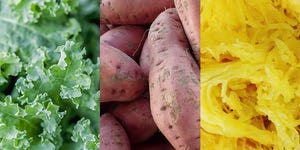Once upon a time, you’d battle it out with you mom over eating your veggies. Broccoli? No thanks. Tomatoes? Hard pass.
But fast-forward to today, and that face-sized salad you had for lunch says that perhaps your taste buds have changed. But…does that actually happen? Or is it just a turn of phrase?
First things first: What exactly are taste buds?
Fun fact: You can’t actually see your taste buds (those little bumps on your tongue are called papillae, and while they do contain taste buds, they also help with chewing, speaking, and cleansing your mouth).
Your taste buds die off and regenerate every few weeks.
Taste buds are all over your mouth—not just your tongue—and there are a lot of them. “Each taste bud is a collection of about 50 to 100 cells that are tasked with testing your food before you swallow it,” says Robin Dando, Ph.D., director of the Cornell Sensory Evaluation Center.
Once the food dissolves in your saliva, it activates receptors at the tips of the cells, which can distinguish between sweet, salty, sour, bitter, and umami (a.k.a. savory). The receptors then send a signal to your brain to relay the exact flavor you’re experiencing.
So, can your taste buds change? If so, how often?
Taste buds die off and regenerate every couple of weeks (sometimes more frequently, given their vulnerable position in the mouth). Essentially, every time you burn or chomp down on your tongue, you kill off more taste buds. (Luckily, they grow back ASAP, which is why you only go a few days without the sweet taste of coffee after scorching your tongue.)

Age also plays a role in how often (and how fast) your taste buds turn over. “As you age, your body slows down in regenerating cells, including the taste and smell receptor cells, leading to potential loss of taste buds as you get older,” says Helene Hopfer, Ph.D., assistant professor of food science at Penn State.
When does this happen exactly? Nothing’s set in stone, but some research says that a change or loss of taste might start kicking in around 60 years old.
Taste buds may also die out due to external circumstances, like taking certain medications or undergoing chemo or radiation, says Dando (but they should come back once your treatment is done).
But what about liking (or disliking) new foods? What’s up with that?
This has to do with more than just your taste buds (which are there to taste, yes, but not to dictate whether or not you like something). Just FYI: Your sense of smell plays a role in taste too, by helping determine the flavor, which, unlike taste, is “a multi-sensory construct that our brain ‘composes’ from multiple sensations, namely taste, smell, sound,” explains Hopfer.

While everyone has a similar sensitivity to the various basic tastes, you develop personal preferences over many years, depending on other factors like habits, upbringing, culture, memories, and context, says Dando. You may have grown to hate salmon for example, because you got the stomach bug after eating it once, so now you associate it with nausea (bleh).
All of those factors can also play into why you might hate Brussels sprouts, while your sister loves them—because your experiences with the food differ.
But that doesn’t mean you’ll hate certain foods forever, either. You can actually retrain your brain to like certain tastes by eating them more frequently. And just as you can acclimate your tastes to like something new (or re-like something old), you can also change them to start disliking something. Take sugar, for example: “I recently tried to cut out soda from my diet and after a short time I found just a sip to be sickly sweet,” says Dando.

Honestly, a lot is still unknown about why you might’ve hated something like tomatoes up until, say, a year or two ago. It could be as simple as experiencing a certain type of food in a new way (like, roasted broccoli instead of steamed), says Hopfer. Or, frustratingly enough, “the brain can also change its mind,” she says, adding that your mind and perceptions (taste, smell) are constantly undergoing changes throughout your life.
The bottom line: Your taste buds regenerate every couple of weeks—but your ever-changing mind and personal experiences have more to do with why you might start to like or dislike a new food.
Source: Read Full Article